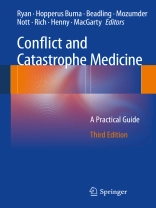The first edition of conflict and catastrophe was produced in 2002 and a second, successful edition, followed in 2009. The decision to produce these works sprung from painful problems experienced by colleagues and authors themselves during many humanitarian and related deployments. The guide for both editions was to provide, in one volume, an entry level text covering all aspects of deployment, with an emphasis on medicine and healthcare in these environments. This third revised, expanded and updated edition of Conflict and Catastrophe Medicine: A Practical Guide follows its successful predecessors in providing a framework for use by health professionals visiting a resource constrained environment. Encompassing problems brought about by local conflict or natural disasters, the book covers preparation, organisation, logistics, treatment of major trauma and medical emergencies, and the special problems of delivering medicine in a hostile environment. This book comprehensively tackles: Self-preparation of health professionals to face a range of medical and related problems which occur in hostile and remote environments; War and disaster medicine, covering acute management, rehabilitation, reconstruction and prevention; Bridging the fields of medicine, nursing, international relations, history, politics and economics. The book also touches on nutrition, infection, trauma, psychiatry and psychological medicine and training.
Daftar Isi
Section 1: The Disaster and Conflict Environment.- 1. New Paradigms: The World in the 21st Century- European Perspective.- 2. New Paradigms: The World in the 21
st Century- A US Perspective.- 3. The Spectrum of Conflict.- 4. The Players- Humanitarian Organisations and their Coordination in Humanitarian Assistance.- 5. The Players- Private Military and Security Companies (PMSCs) in the Humanitarian Space.- 6. Medical Ethics in Disasters.- 7. Medicine at High Altitudes.- 8. Medical Support of Special Operations.- 9. Terrorism 101.- Section 2: Disasters, Public Health, and Populations.- 10. Disasters: An Overview.- 11. Disasters: The London Bombings, 7th July 2005: Forward Medical Response.- 12. Responding to Acute Humanitarian Crises: Health Needs Assessment and Priorities for Intervention.- 13. Responding to Acute Humanitarian Crises: The Role of Health System Levers in Response, Recovery and Rebuilding to Protect Population Health.- 14. Responding to Acute Humanitarian Crises: Health Planning in Action ‘Operation Phoenix’: A British Medical Aid Program to Sarajevo.- 15.Responding to Acute Humanitarian Crises: Health Care of Prisoners and Detainees.- 16. Standards of Care in Catastrophic Emergencies.- 17. Program Management and Assessment.- 18. Surveillance and Control of Communicable Disease in Conflicts and Disasters.- 19. The Sword of Damocles: Whither the Next Pandemic.- Section 3: Living and Working in Austere Environments.- 20. Getting there and Being Involved: Getting Involved.- 21. Getting there and Being Involved: Team Building and Maintenance.- 22. Safety and Security: Staying Safe and Effective- In a Humanitarian Context (Or as Safe as is Reasonably Possible When You Know You Should Have Stayed at Home!).- 23. Safety and Security: Thinking Ballistic- Aspects of Protection.- 24. Safety and Security: Mines and Weapons Awareness.- 25. Safety and Security: Health Risk Management- A Tool for Planning Force Health Protection.- 26.Applied Communications for Medical Professionals in Conflict and Catastrophe Situations.- 27. Psychosocial and Mental Health Care for the Deployed Staff of Rescue, Professional First Response and Aid Agencies, NGOs and Military Organisations.- Section 4: Hospitals and Health Systems.- 28. Conflict Recovery: Health Systems in Transition.- 29. Eating an Elephant: Intervening in Hospitals- Pristina.- 30. Military Medical Contribution to Indigenous (Military and Civilian) Health Sector Development (HSD) within Security and Stabilisation Operations.- 31. Military Health Services Support in Conflict.- 32. Evacuation and Transportation.- 33. Deployed Field Hospitals in the 21st Century.- Section 5: Clinical Care.- 34. Acute Problems and Emergency Surgery: A. Introduction- Scene-Setting.- 35. Acute Problems and Emergency Surgery: Triage and Acute Care.- 36. Acute Problems and Emergency Surgery: Ballistics and Blast.- 37. Acute Problems and Emergency Surgery: Tropical Diseases.- 38. Acute Problems and Emergency Surgery: Climate: Hot and Cold- An Aide.- 39. Acute Problems and Emergency Surgery: Envenomations- Bites and Stings.- 40. Acute Problems and Emergency Surgery: Head Injury.- 41. Acute Problems and Emergency Surgery: Dental, Maxillofacial, Eye, and ENT.- 42. Acute Problems and Emergency Surgery: Abdominal Complaints and Acute Surgical Emergencies.- 43. Acute Problems and Emergency Surgery: Soft Tissues and Skeleton.- 44. Acute Problems and Emergency Surgery: Surgery in the Tropics.- 45. Acute Problems and Emergency Surgery: Anaesthesia and Analgesia.- 46. Chemical, Biological, Radiological, and Nuclear (CBRN) Casualty Management Principles.- 47. Women’s Health.- 48. The Care of Children in Complex Humanitarian Emergencies and Disasters.- 49. The Psychosocial and Mental Health of People Who Are Affected by Conflict, Catastrophes, Terrorism, Adversity, and Displacement.- Section 6: Resources.- 50. Preparing to Deploy: Materials and Information.- 51. Rehabilitation Diagnostic Laboratories.- 52. Enablers and Confounders: Achieving the Mission.- 53. The Military Approach to Medical Planning.- 54. Accreditation in Field Medicine.- 55. Humanitarian Work in the Era of Modernising Medical Careers.- 56. Code of Behaviour.












